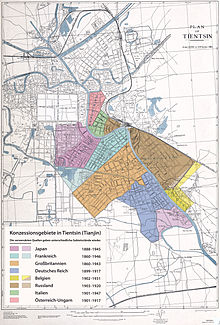Maurice Joostens
As a signatory of the Boxer Protocol, the final act at the Algeciras Conference and the Colonial Charter in which the Congo Free State was ceded to Belgium, Joostens was an important Belgian diplomat in the age of New Imperialism.
Throughout his career, Joostens was able to gain the absolute confidence of king Leopold II of Belgium and eventually he became one of the monarch's favourite diplomats.
Before he pursued a career in the diplomacy, Joostens shortly followed in the footsteps of his father being active in the Antwerp banking scene where he had a job at the Handelsbank.
[4] On 7 December 1885, Joostens filed his request at the Belgian ministry for foreign affairs to become a so-called attaché de légation and this was the start of his diplomatic career.
In 1889, Joostens made promotion to the legation in Cairo, where he served the Belgian imperial interests of, for example, Édouard Empain and the Tramways d'Alexandrie.
By order of Leopold II, Joostens used the allure of the royal visit to attract investors for a Belgian-American cooperation to build the Beijing–Hankou Railway.
Although he didn't succeed to forge a cooperation between the American China Development Company and the Belgian investments backed by Leopold II, Joostens was able to show his feel for the diplomatic game in this episode and obtain the appreciation of the king.
[6] Next to the royal visit of prince Albert and the Beijing-Hankou Railway, the remarkable plan to make the Philippines a Belgian protectorate after the Spanish–American War was a third case in which Joostens was active.
[7] During his holidays in Belgium recovering from an uninterrupted three years stay in the United States, Joostens was named secretary for the Belgian delegation for the Hague Peace Conference of 1899.
During this conference Joostens could gain more experience in the field of international relations under the guidance of delegation leader and well-known disarmament advocate Auguste Beernaert.
[8] Only fourteen years after his first application to the Belgian ministry of foreign affairs, Joostens was promoted in the winter of 1899 to the rank of Envoy Extraordinary and Minister Plenipotentiary at the court of the Chinese emperor and the king of Siam.
This rebellion had anti-foreign, anti-Christian and mystical features and had among other things its origins in a crop failure in 1899, decades of frustrations about the Western presence in China and the chaos and internal struggles at the Chinese court following the failed Hundred Days' Reform.
Shortly after the rebels sieged the Legation Quarter, the foreign powers gathered their forces and formed the Eight-Nation Alliance to crush the rebellion manu militari [fr].
Nevertheless, both the foreign powers ( France, Germany, Japan, United States, United Kingdom, Russia, Austria-Hungary, Italy, Belgium, The Netherlands and Spain) and the pro-foreign officials at the Chinese court such as Li Hongzhang and Yikuang (Prince Qing) wanted to reach a settlement over the Chinese responsibility in the rebellion.
Although Ernest Mason Satow and Alfons Mumm von Schwarzenstein, respectively the British and German envoy, preferred from the start on that only the members of the Eight-Nation Alliance settled these matters, Joostens succeeded to conquer his place at the negotiation table.
The Belgian envoy was for example the chairman of the Committee on the Indemnities and inspired by the losses of the Societé d’Étude de chemins de fer en Chine, the Belgian company behind the Beijing-Hankou Railway, he proposed to include also indirect losses of companies and societies in the indemnity claims.
Joostens diplomacy during the Conference is at best summarized as an execution of the orders of his minister Paul de Favereau with the addition of personal initiatives within a typical Leopoldistic imperial mindset.
Despite the failed development of this concession because of a lack of interest from Belgian investors, Joostens succeeded to obtain this parcel despite the criticism of the other powers.
Even after the signature of the Boxer Protocol, the payment of the indemnities was still an unsolved problem and in this context Joostens tried to convince his government not to found a Belgian bank.
Finally the different receptions, dinners and ceremonies celebrating Joostens' return to Belgium tightened to bonds within the Belgian imperialist lobby.
Being appointed as the envoy in Madrid Joostens was for the first time in his career promoted to be the highest-ranking official in a legation of a traditional European power.
[22] Following the First Moroccan Crisis Joostens was appointed by Leopold II to attend the Algeciras Conference together with Conrad de Buisseret [nl].



